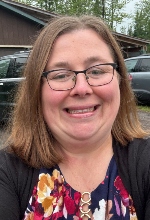 By Laura Martinsen, BS, CSW
By Laura Martinsen, BS, CSW
Three simple words can forever change your life. They have the ability to shift your focus to what truly matters. Those three words, “You have cancer,” have a distinct way of dividing your life into two halves, BC – before cancer and AD – after diagnosis.
Often, after a cancer diagnosis, your brain almost automatically has a million thoughts, fears, and questions swirl through your head. “Am I going to die?” “How am I going to be able to keep working?” “What if I leave my kids without a mom [dad]?” and so much more.
As oncology social workers, we are given the opportunity to work with people who are often at the lowest points of their lives. The beauty that is found within these situations is empowering people to take control of their own health. We provide ample amounts of active listening and with gentle guidance people are able to make health care decisions that impact their daily lives. One way we can empower oncology patients is by navigating the complex and, oh so, important conversations of advance care planning.
Too many times in society, it isn’t until a person is sick and/or dying that advance care conversations begin. As an oncology social worker, I used to fear when I would have to speak with patients who are nearing death not quite knowing how to navigate the conversation and fear that I was doing more harm than good.
As time has passed, it has become a personal mission of sorts to have the conversation of one’s wishes, goals, and values related to treatment and healthcare with patients more often. Having these difficult conversations can help to instill a sense of control in a patient’s life when so many things are out of their control. To help facilitate conversations with patients, some questions you might ask are:
- What makes your life worth living?
- What personal and religious/spiritual beliefs and values shape how you make choices about health care?
- If end-of-life is near, what would you want your family and/or friends to know about you and your health care preferences?
- What are your health care goals (keeping in mind quality vs. quantity of life)?
- What do you understand about your health and illness?
Having the answers to these questions can have a tremendous impact on how best to communicate with not only your health care team, but your loved ones as well. Dr. Angelo Volandes once said, “What people need most on this journey is not the promise of the next new technology but rather a guide to help navigate this dark forest in which they will undoubtedly find themselves.” My challenge for you is to be the one that has those difficult conversations with your patients. Simply put, talking about end-of-life care has the power to transform how you live your life.

